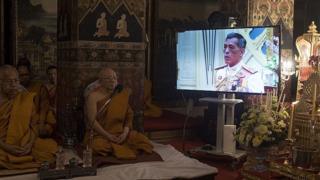Thailand country profile
Thailand is the only country in south-east Asia to have escaped colonial rule. Buddhist religion, the monarchy and the military have helped to shape its society and politics.
The military has ruled for most of the period since 1947, with a few interludes in which the country had a democratically elected government.
Since 2001, Thai politics have been dominated by the irreconcilable split between supporters and detractors of Thaksin Shinawatra, who served as prime minister until he was ousted by the military in 2006.
Thaksin’s sister Yingluck became prime minister following the 2011 election but was in her turn ousted by a military coup in 2014.
FACTS
Kingdom of Thailand
Capital: Bangkok
Population 69 million
Area 513,115 sq km (198,115 sq miles)
Major language Thai
Major religion Buddhism
Life expectancy Life expectancy: 71 years (men), 79 years (women)
Currency baht
LEADERS
Head of state: King Maha Vajiralongkorn
Thailand is a constitutional monarchy.
Maha Vajiralongkorn, the 10th Thai monarch of the Chakri dynasty, was proclaimed king in December 2016.
He succeeded his father King Bhumibol Adulyadej, the world’s longest reigning monarch at the time, who had died in October.
He has not achieved the same level of popularity as his widely-revered father, and there has been criticism of his lifestyle.
Prime minister: Prayuth Chan-ocha
General Prayuth Chan-ocha seized power in a coup in May 2014, and was named as prime minister by the military-appointed parliament a few months later.
Thailand’s military has a history of intervening in politics and has seized power 12 times since the end of the absolute monarchy in 1932.
Elections in March 2019 saw him confirmed in office with the support of the Palang Pracharath Party.
MEDIA
The government and military control nearly all the national terrestrial television networks, and operate many of Thailand’s radio networks.
The media are free to criticise government policies, and cover instances of corruption and human rights abuses.
A strict lese majeste law prohibits media in Thailand from reporting anything that could be deemed critical of the royal family, and journalists tend to exercise self-censorship regarding the military, the judiciary and other sensitive issues.
TIMELINE
Some key dates in Thailand’s history:
1932 – Absolute monarchy gives way to constitutional monarchy with parliamentary government.
1947 – First post-WWII military coup. The military retains power continuously until 1973.
2001 – Populist Thaksin Shinawatra becomes prime minister for first time.
2006 – Military leaders stage a bloodless coup.
2011 – Pro-Thaksin Pheu Thai party wins a landslide victory in elections. Thaksin’s sister Yingluck becomes prime minister.
2014 – Army again seizes power.
2016 – King Bhumibol Adulyadej dies after 70 years on the throne and is succeeded by his son, Maha Vajiralongkorn.
Source: Read Full Article



